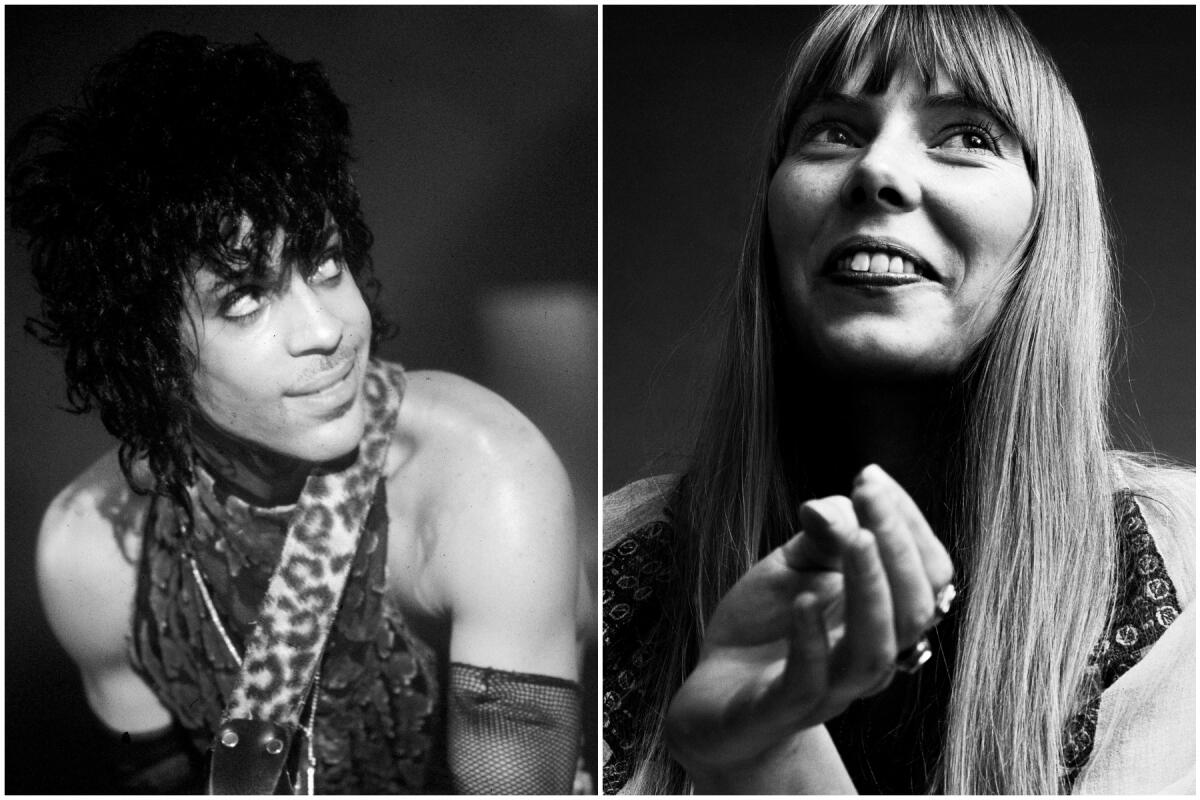The best Joni Mitchell cover ever? How Prince blended purple and ‘Blue’ on ‘A Case of You’

- Share via
On April 14, 2016 — exactly one week before he died — Prince played his final two concerts at the Fox Theatre in Atlanta.
Among the tunes he performed across an early show and a late show that night were several he’d been singing and re-singing, making and remaking, for much of his life, including “Purple Rain,” “Dirty Mind,” “Little Red Corvette” — and “A Case of You,” Joni Mitchell’s wise and yearning love song from her landmark 1971 album, “Blue,” which turns 50 this week.
In Atlanta, Prince did “A Case of You” as a tender, stripped-down piano-and-voice number, not unlike the take captured in an intimate early-’80s demo pulled from the artist’s famous vault after his death and released on the 2018 album “Piano & a Microphone.”
According to reviews of the Fox Theatre gig, Prince dashed offstage following his rendition of Mitchell’s tune, which ponders all the ways that love changes — and doesn’t change — a person in its thrall. “Sometimes I forget how emotional these songs can be,” he told the audience when he came back.
On “Blue”’s “All I Want,” Joni Mitchell asked “Looking for something, what can it be?” The answer was Joni Mitchell.
Yet at other points in his four-decade career, Prince performed “A Case of You,” with its religious imagery and its winding melody, as a kind of psychedelic guitar jam and, most memorably, as the gloriously churchy soul ballad that appeared (under the title “A Case of U”) on 2002’s “One Nite Alone…” LP before turning up again on a high-toned 2007 Mitchell tribute album.
Stately, sensual and with some of the most stirring harmonic movement in his catalog, the latter might be the finest cover version he ever recorded — a perfect blend of purple and “Blue.”

Prince’s returning to “A Case of You” was just one aspect of his lifelong fascination with Mitchell, who’s claimed she remembers seeing a teenage Prince in the front row of a show she played in Minneapolis in the mid-’70s behind “Court and Spark.”
“He had those distinctive eyes, like a puffin or Egyptian wall paintings, and he sat to the left of me … with his head kind of cocked,” she told Jay Leno on “The Tonight Show” in 1995. “I played a lot of my set to him. Very young and impressionable musician, so I guess that night meant something to him.”
In 2005, she said in an interview with New York magazine that Prince “used to write me fan mail with all of the U’s and hearts that way that he writes.” Her staff, she added with a laugh, “took it as mail from the lunatic fringe and just tossed it.”
In a rare interview, Joni Mitchell talks with Cameron Crowe about the state of her singing voice and the making of “Blue,” 50 years after its release.
Prince himself spoke repeatedly of his affection for Mitchell’s jazzy and poetic “The Hissing of Summer Lawns,” though he told a reporter in 2004, “I love all of Joni’s music.” He covered her songs, he said, “just to keep her name out there. Joni’s music should be taught in school, if just from a literature standpoint.”
In “The Ballad of Dorothy Parker,” from 1987’s “Sign o’ the Times,” he quotes a line from Mitchell’s “Help Me” when Dorothy flips on the radio and finds her favorite song playing; the title of 1984’s “Ice Cream Castle,” by Prince’s protégés in the Time, refers to a lyric from Mitchell’s “Both Sides Now.”
He even wrote a tune during the “Sign” sessions with the idea that Mitchell might sing it: a throbbing funk track called “Emotional Pump” in which the narrator admits to being “so blue” even as the groove evokes a steamy boudoir. Alas, Mitchell turned down Prince’s offer.
“I called him up and I said, ‘I can’t sing this — I’d have to jump around in a black teddy,’” she told Mojo magazine in 1994. (Prince’s rendition of “Emotional Pump” ended up among the trove of outtakes and bonus cuts included in last year’s lavish “Sign o’ the Times” box set.) “He’s a strange little duck,” Mitchell added, “but I like him.”

Although Mitchell enjoyed Prince’s praise, she “had difficulty hearing her influence on him,” according to biographer David Yaffe, who interviewed her extensively for his book “Reckless Daughter.” In a 1988 appearance on a Dutch TV program, Mitchell recalled a listening party for an unspecified Prince album where she sat next to him as they took in his new music.
“From time to time, I would comment and say, ‘Oh, I love that chord,’ or ‘I love that progression — where did you get that from?’ And he would say, ‘From you,’” Mitchell said. “But I wouldn’t recognize it.”
We asked 10 of our favorite artists to each choose one track from Joni Mitchell’s ‘Blue’ and describe what makes the song and artist so indelible.
She may simply be too close to judge. To anyone else, it’s easy to view Prince’s stylistic restlessness — his veering among rock, pop, R&B and whatever it is he’s doing in “Sometimes It Snows in April” — in the shadow of the experimentation with jazz that Mitchell had just begun when Prince watched her transfixed from that front-and-center seat.
Think too about their shared interest in writing about how love and sex play out against a cultural backdrop — how romance is always a sort of performance shaped by both instinct and expectation, free will and tradition.
Think of the indelible visual detail that connects their songs: the barmaid dressed in fishnet stockings and a bowtie in Mitchell’s “The Last Time I Saw Richard,” or the woman wearing a fancy hat and not much more in Prince’s “Raspberry Beret.”

And think of the way they both organized their unconventional lives around art. That’s what strikes you as Prince skips the first verse of “A Case of You” — something he did no matter how he was presenting the song — to open his cover with Mitchell’s second verse about being a lonely painter who lives in a box of paints.
In his later years singing “A Case of You,” Prince would make other adjustments, changing Mitchell’s “I’m frightened by the devil” to “I used to be frightened by the devil,” presumably as a result of his becoming a Jehovah’s Witness in the early 2000s. The version on “One Nite Alone…” also ends with a slinky outro of his own design.
But in those sad yet satisfied lines about loneliness — about the self-reliance necessary to achieve true abandon — you can hear the understanding that Prince discovered in Mitchell’s music. She said, “Love is touching souls,” and surely she touched his.
More to Read
The biggest entertainment stories
Get our big stories about Hollywood, film, television, music, arts, culture and more right in your inbox as soon as they publish.
You may occasionally receive promotional content from the Los Angeles Times.










